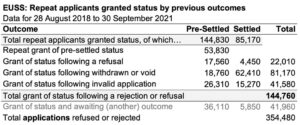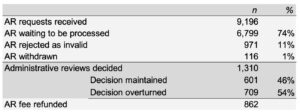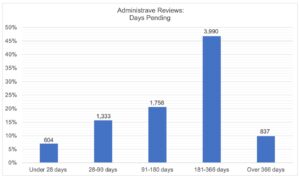- BY Alice Welsh and Kuba Jablonowski

How accurate are EU Settlement Scheme decisions? Here’s what the data shows
THANKS FOR READING
Older content is locked

A great deal of time and effort goes into producing the information on Free Movement, become a member of Free Movement to get unlimited access to all articles, and much, much more
TAKE FREE MOVEMENT FURTHER
By becoming a member of Free Movement, you not only support the hard-work that goes into maintaining the website, but get access to premium features;
- Single login for personal use
- FREE downloads of Free Movement ebooks
- Access to all Free Movement blog content
- Access to all our online training materials
- Access to our busy forums
- Downloadable CPD certificates
Page contents
The EU Settlement Scheme (EUSS) opened in 2018 and had issued almost 6.5 million decisions by the end of June 2022. The sheer scale of the scheme is a remarkable achievement for the Home Office. The department took on a momentous task when the UK government decided that everyone who lived in the UK under EU free movement law needed to apply for new immigration status after Brexit.
But the success of the scheme can only be determined by the number of people who have been provided with the correct status. Understanding the number of EUSS decisions that have been challenged, and the success rate of such challenges, is therefore at least as important as the raw number of decisions issued.
Background: challenging an EU decision
People may seek redress where an EUSS application has not resulted in a grant of status: for example, if it was refused or deemed invalid, or if the incorrect status was granted. The latter situation arises because “successful” applicants may be granted pre-settled status despite applying for settled status. Around 167,000 applications for settled status between 2019 and 2021 resulted in the person instead getting pre-settled status, a recent report by the Migration Observatory has shown. Such decisions, which the Home Office calls “variations of leave”, represented 7% of all pre-settled status grants in that period.
There are three main routes available to those seeking to challenge an incorrect EUSS decision: making a repeat application, requesting an administrative review, and appealing to the immigration tribunal. There are other routes of challenge (such as judicial review, a complaint to the Home Office or writing to a local MP) but these numbers will be relatively low and will likely be explored after the three routes of challenge discussed in this blog have been exhausted.
New data from freedom of information (FOI) requests have begun to shine a light on these challenges to EUSS decisions.
Repeat applications
Our analysis of the quarterly statistics and data obtained through FOI suggests that submitting a fresh application has been the most popular way of challenging an EUSS decision.
There are good reasons for this. Repeat applications are free; there is no requirement to learn new processes as the person will already have submitted one application; and it offers an opportunity to gather and submit any additional evidence.
While we don’t know exactly how many repeat applications there have been, Figure 1 below shows that there were almost 145,000 grants of status from a repeat application following a refusal or rejection by the end of September 2021. A further 42,000 applicants were granted status following a refusal or rejection and had another application pending (perhaps having submitted multiple applications).

Given that there were around 354,000 refusals and rejections in that period in total, the success rate of making a repeat application following refusal/rejection is at least 40%. This rises to over 50% if repeat applicants granted status but who have another application pending are included.
While repeat applications have been the most popular type of challenge, Home Office guidance now states that people who have already received a refusal from a late application “will not normally be able to establish that there are reasonable grounds for them to make a further late application to the scheme”. This suggests that, while repeat applications will continue to be available to those seeking to upgrade from pre-settled to settled status, the shutters are starting to come down on repeat applications to rectify an outright refusal. Applicants faced with a refusal will have to turn to administrative reviews or tribunal appeals.
Administrative review
Administrative reviews are the second most common form of challenge. This remedy allows applicants to request that the original decision be reviewed by a decision-maker in a different unit of the Home Office to look for caseworker error. Unlike other administrative reviews, an EUSS review allows the person to submit additional evidence in support of their application. The review costs £80, refundable where a decision is overturned on the original evidence.
Freedom of information data shows that 54% of EUSS administrative reviews decided by 31 January 2022 were successful. While this is a substantial dip compared to the 90% success rate recorded in 2019, it is still considerably higher for EUSS decisions than in other areas (31% in 2018/19).
The data also shows a substantial backlog. Of the 9,200 requests for administrative review received by 31 January 2022, only 2,400 were concluded. A significant proportion of concluded reviews were invalid or withdrawn, so only around 1,300 reviews have been fully carried out.

The backlog of nearly 7,000 cases is likely to be causing significant upheaval to the lives of people waiting for their case to be re-examined. Administrative reviews are supposed to be quick; traditionally, the service standard has been set at 28 days. The Home Office website on EUSS reviews used to reflect that, saying (until August 2021): “you’ll usually receive the result of the review within 28 days”. It now warns that decisions may take “6 months or more”.
This may in part be down to the fact that additional evidence can be submitted, making an EUSS review more time-consuming than other types. But there are also delays across all aspects of Home Office decision-making, with the website referring to “unprecedented levels of applications.
FOI data bears out the expected timeline for a decision on an EUSS review. The data in figure 3 was taken from a live database on 30 April 2022. It shows that the bulk of pending applications have been waiting for between six and 12 months.

Tribunal appeals
The third main option is to appeal to the First-tier Tribunal. Some applicants will go straight to the tribunal, without requesting an administrative review; others will be challenging a decision that has been upheld on review.
There had been 2,900 EU Settlement Scheme appeals lodged up to 28 February 2022 but only 790 decided, FOI data shows. Of those, 295 (37%) were successful.

We do not know from these data how many appeals were decided on the papers and how many involved an oral hearing. Nor do we know how many people were without legal representation. There is also still a substantial number of appeals yet to be heard (over 2,100). Further updates will be useful to examine how many EUSS decisions require judicial intervention to be corrected.
One concerning aspect is the discrepancy between the number of successful appeals (295) and the number of status grants as a result of an appeal: only 34. There might be a delay in granting status after an appeal is allowed if, for example, the Home Office is seeking to appeal a decision, but it is unclear to us why there should be such a significant time lag. We would welcome some explanation from the Home Office on this point.
–
Overall, these data suggest that hundreds of thousands of EU Settlement Scheme decisions have required some form of remedy to be corrected. At each stage of a potential challenge, well over a third of initial decisions are overturned.
Additionally, administrative review and tribunal appeals take many months to be decided even as the most popular route of challenge (a repeat application) becomes increasingly closed off. While there are emerging questions and gaps in the data on redress mechanisms for the EUSS, the proportion of applicants successfully challenging initial outcomes may indicate weaknesses in initial decision-making, flaws in the “digital by default” approach, or issues with the design of the EU Settlement Scheme itself.

One Response
See also Repeat applications to the EU Settlement Scheme.